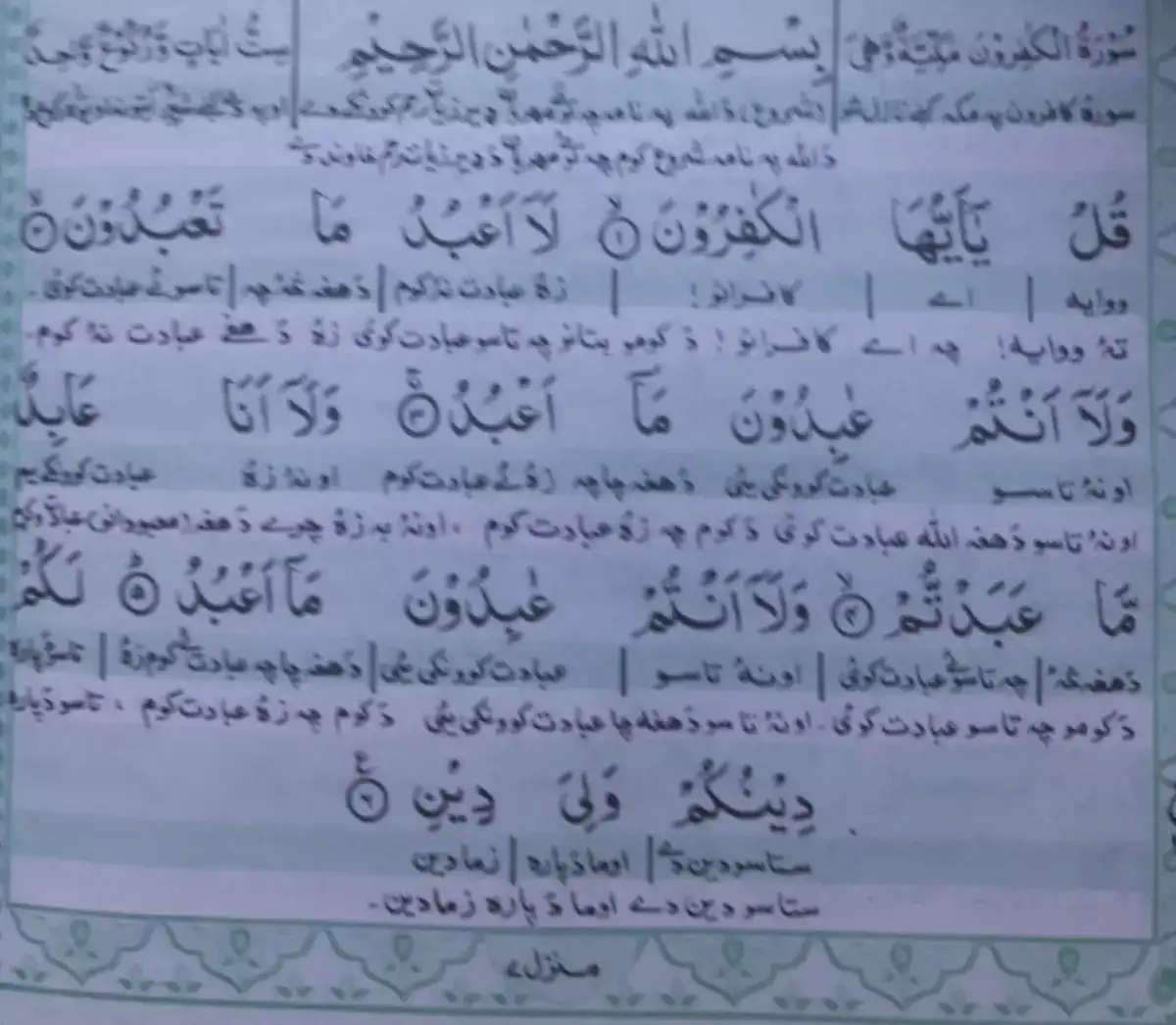Surah kafiroon with Urdu translation, known as the Surah of Disassociation, is a brief yet profound chapter of the Quran, comprised of six verses. Within its concise structure, this surah articulates the fundamental principles of Islamic faith with clarity and conviction. It stands as a beacon of guidance for Muslims, offering strength and resilience amidst societal challenges.
Understanding the Essence
Surah Kafiroon unequivocally asserts the oneness of Allah and the rejection of polytheism. Its verses emphasize the distinction between monotheistic belief and the worship of false deities. This surah was revealed in Makkah during a period of intense persecution, serving as a source of solace and fortitude for the early Muslim community.
Embracing the Message in Urdu
The beauty of Surah Kafiroon is amplified when experienced through Urdu translation. Urdu, with its rich linguistic heritage, imbues the verses with emotional depth and resonance. Let’s explore the surah with Urdu translation:
بِسْمِ اللَّهِ الرَّحْمٰنِ الرَّحِيمِ
(تمام کام اللہ کے نام سے شروع جو بڑا مہربان نہایت رحم والا ہے۔)
Translation of Kalma: [In the name of Allah, the Most Gracious, the Most Merciful]
قُلْ يَا أَيُّهَا الْكَافِرُونَ
(کہو کہ اے کافرو!)
Translation: (Say, “O disbelievers!”)
لَا أَعْبُدُ مَا تَعْبُدُونَ
(میں وہ نہیں پوجتا جس کی تم عبادت کرتے ہو۔)
Translation: (I do not worship what you worship.)
وَلَا أَنْتُمْ عَابِدُونَ مَا أَعْبُدُ
(اور تم وہ نہیں پوجتے جو میں پوجتا ہوں۔)
Translation: (Nor will you ever worship what I worship.)
وَلَا أَنَا عَابِدٌ مَّا عَبَدتُّمْ
[اور نہ ہی میں وہ پوجتا ہو. جو تم پوجتے ہو۔]
Translation: (And I will not worship what you have worshipped.)
وَلَا أَنتُمْ عَابِدُونَ مَا أَعْبُدُ
[اور نہ تم وہ پوجو گے, جو میں پوجتا ہوں۔]
Translation: (Nor will you ever worship what I worship.)
لَكُمْ دِينُكُمْ وَلِيَ دِينِ
(تمہارا دین تمہیں اور میرا دین مجھے۔)
Translation: (To you is your religion, and to me is my religion.)
Translation: (In the name of Allah, the Most Gracious, the Most Merciful) Say, “O disbelievers, I do not worship what you worship. Nor will you ever worship what I worship. And I will not worship what you have worshipped. Nor will you ever worship what I worship. To you is your religion, and to me is my religion.”
Unlocking the Significance
Surah Kafiroon holds a special place in Islamic worship, with its recitation being a Sunnah in daily prayers. Its verses elucidate the distinction between monotheism and polytheism, reinforcing the foundational principles of faith and Tawhid. Reciting this surah is not only a ritual but also a reaffirmation of one’s commitment to Allah and the Islamic creed.
In Conclusion
Surah Kafiroon, with its concise yet profound message, serves as a guiding light for Muslims worldwide. Through its verses, believers reaffirm their commitment to the oneness of Allah and the rejection of false deities. As we reflect on its significance, may Surah Kafiroon continue to inspire and illuminate our spiritual journey.
Related post:
| Surah Baqarah Last 2 Ayat PDF |
| Surah Baqarah Last Ruku: Recite with Insight |
| Surah Tauba last two Ayat full pdf download |
| Surah feel with Urdu translation |
FAQs:
Surah Kafiroon with Urdu translation refers to the chapter of the Quran containing six verses that emphasize monotheism and rejection of polytheism, presented alongside their Urdu interpretations.
Surah Kafiroon with Urdu translation is available on various online platforms, Islamic websites, and Quranic apps that provide comprehensive resources for studying the Quran in different languages.
Surah Kafiroon with Urdu translation holds significance as it enables Urdu-speaking individuals to understand and connect with the profound message of monotheism conveyed in this chapter of the Quran, fostering a deeper spiritual understanding and connection.




